Snow blanketed parts of Lebanon on Wednesday, blocking roads and disrupting traffic. Storm Joyce hit late Tuesday in Lebanon with gale force winds registering between 85 km/h (52 miles/h) and 100 km/h (62 miles/h). The storm is expected to get stronger Thursday. Breaking a warm spell, the storm brought heavy rainfall, a sharp […]
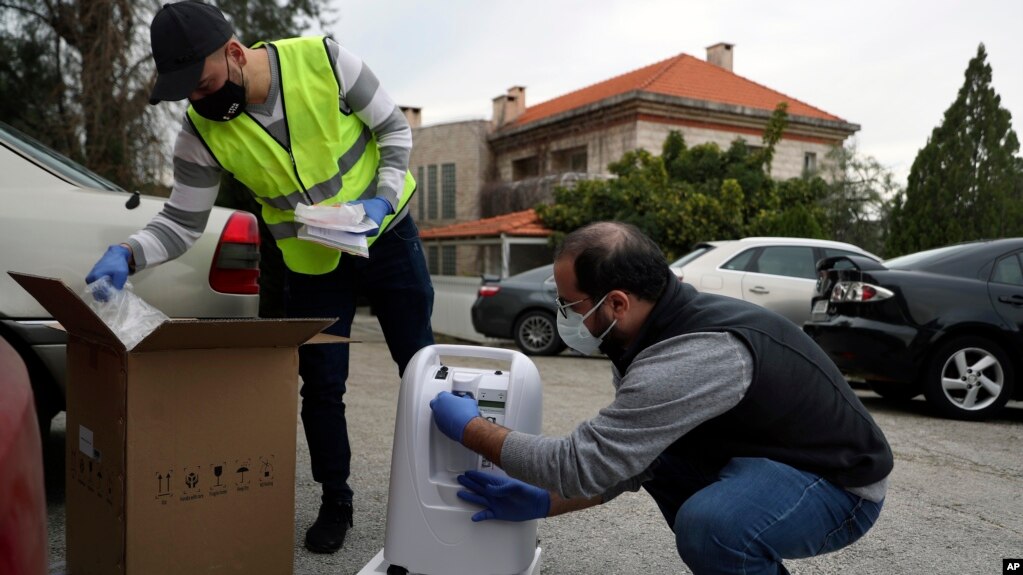
by learningenglish.voanews.com — Recently in Beirut, a small group of people cleaned oxygen machines to send to those in need. The move was the latest in a series of activities by a Lebanese group trying to serve the public during the country’s health and economic crises. Melissa Fathallah is one of the founders of Baytna Baytak, which in Arabic means Our Home is Your Home. “No one is exempt from COVID. Nobody. Nobody has super-power immunity,” she told the Associated Press. Immunity means the power to keep yourself from being infected by a disease. Raising more than $27,000, the group has placed 48 oxygen machines with those in need across the country.
Baytna Baytak began at the start of the COVID-19 pandemic with a very different project. The group found homes for medical workers who were worried about bringing the virus to their families. During Lebanon’s first lockdown in March, the group housed 750 workers in different places. Chloe Ghosh works at a government hospital in Beirut. She has been living in housing provided by the group since the start of the pandemic. She was worried about putting her family at risk. “If I got COVID or anyone my age got COVID, we could survive,” Ghosh said. “But our families, no.” The first place Ghosh stayed was damaged when another disaster hit Beirut, the August 4 explosion at the city’s port. The blast killed more than 200 people, injured 6,000 others and destroyed thousands of homes. Ghosh was not harmed. She moved to another place provided by Baytna Baytak. She now shares a four-bedroom apartment with three other medical workers who work in different hospitals around the city.

by english.aawsat.com — The judicial investigator probing the Beirut port explosion, Judge Fadi Sawwan summoned former public works minister Youssef Fenianos and the port’s former customs chief Moussa Hazimeh to appear for interrogation next Thursday, Lebanon’s National News Agency said on Monday. Six months after one of the largest non-nuclear explosions on record, which injured thousands of people, victims are still awaiting the result of the investigation, although Lebanese leaders had promised it would come within days. Sawwan had already called former finance minister Ali Hassan Khalil, along with former public works ministers Ghazi Zoaiter and Fenianos for questioning over the blast. However, Zoaiter and Hassan Khalil refused to attend the questioning, saying that as current members of parliament, they enjoy immunity.
The highly explosive chemicals that triggered the Beirut port explosion last August 4 were stored for years in poor conditions at the port, which lies in the heart of the capital. Since August, Sawwan has brought charges against 37 people. But many Lebanese remain skeptical that senior politicians will be held to account, fearing the truth will never emerge from a system riven by corruption. Lebanese authorities have failed in the past six months to deliver any justice for the catastrophic explosion, Human Rights Watch said in a report released early this month.
BEIRUT (Reuters) – Lebanon’s Hezbollah leader Sayyed Hassan Nasrallah on Tuesday dismissed accusations of any links between the group and the killing of researcher and activist Lokman Slim. “Any incident that happens in your area then you are accused until the opposite is proven? Is this something that is practiced in the whole wide world? Where else is this logic present?” Nasrallah said in a televised speech. Activist Lokman Slim was shot and found dead in his car in south Lebanon earlier in February, marking the first killing of a high-profile activist in years. He was a critic of the Iran-backed Hezbollah group. His sister has suggested he was murdered because of those views. Hezbollah has previously condemned the killing.
A filmmaker and publisher, Slim had spoken out against what he called Hezbollah’s intimidation tactics and attempts to monopolise Lebanese politics. Nasrallah was also critical on Tuesday about blame pointed at the group for involvement in the Aug. 4 Beirut blast that killed 200 people. “Hezbollah is guilty until proven otherwise – what kind of a rule is that? …Beirut port – you, Hezbollah, blew up Beirut port until the truth about the explosion is revealed,” he said. The judicial investigation into the blast is still under way in Lebanon with judge Fadi Sawan having charged caretaker Prime Minister Hassan Diab, whose cabinet quit after the blast, and three former ministers with negligence. Sawan is due to interrogate one of the three former ministers, Youssef Finianos, a Hezbollah ally sanctioned by the United States for his links to the group that Washington considers a terrorist organisation.

by thearabweekly.com — BEIRUT – Paralysed by financial crisis and riven with political risk, a number of Lebanon’s banks are struggling to meet a Central Bank target to raise their capital defences by 20% by the end of this month. Less than half of the country’s dozen or so large banks are expected to meet the requirement, which the central bank set in August to reinforce the sector, according to four banking sources with direct knowledge of the situation. Those that are on track to meet central bank targets have largely tapped existing shareholders or depositors, converting local dollar deposits into equity instruments or sold overseas businesses. The situation underscores the scale of the problem facing Lebanon’s banks, heavily exposed to one of the world’s most indebted states and starved of funding. Their customers have largely been frozen out of their dollar deposits and blocked from transferring cash abroad since late 2019.
Given the wall of losses facing the sector, some investors and economists say it’s too little too late anyway. The 20% target laid down by Riad Salameh, Lebanon’s veteran Central Bank governor, is equivalent to around $4 billion, he confirmed to Reuters. That is far short of the $83 billion hole in banks’ balance sheets estimated by the outgoing government last year as part of a financial rescue plan it had drawn up. — ‘All insolvent’ — “They are all insolvent,” said Mike Azar, a debt finance advisor and a former lecturer in international economics at John Hopkins School of Advanced International Studies. “There’s no prospect for recovery as things stand, until there is a sector-wide bank resolution and restructuring and finally a fresh capital raise.”
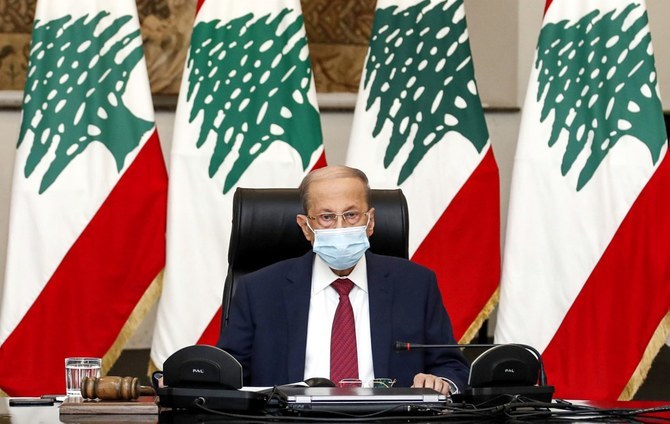
By NAJIA HOUSSARI – arabnews.com — BEIRUT: Lebanese President Michel Aoun has blasted Prime Minister-designate Saad Hariri for a speech containing “inaccuracies and incorrect information.” The two leaders have been at loggerheads for months, unable to agree on the formation of a government and each blaming the other for the lack of progress. Hariri returned as prime minister-designate last October, almost a year after he stepped down under street pressure. Lebanon’s government had quit after the Aug. 4 port blast in Beirut and remains in a caretaker capacity. Hariri on Sunday gave a televised speech marking the 16th anniversary of his father’s assassination. He said he was not responsible for the political stalemate that was undermining the country’s ability to deal with the many troubles it was facing, including the coronavirus pandemic, an economy in crisis and the aftermath of the port explosion. He also objected to allegations that he had infringed on the president’s prerogatives in forming the government or on Christians’ rights, but added that he “did not allow the president to choose the ministers he wanted, especially Christian ministers.”
A 1943 unwritten agreement, the Lebanese National Pact, between then-President Bechara El-Khoury and Prime Minister Riad Al-Solh founded independent Lebanon as a multi-confessional state. It was a power-sharing arrangement between Christians and Muslims, whereby the president was always required to be a Maronite Christian, the prime minister a Sunni Muslim, and the speaker of parliament a Shiite. Aoun hit back at Hariri in a statement. “Hariri exploited the anniversary of his father’s martyrdom and included in his speech many inaccuracies and incorrect information. Hariri is trying to impose new norms that are contrary to principles, the constitution, and the Lebanese National Pact,” the president said.
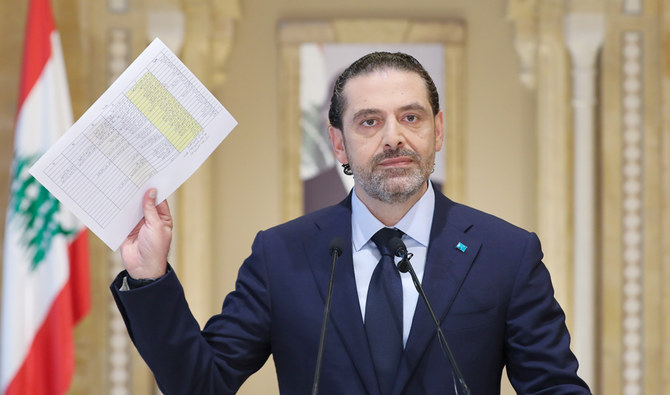
by arabnews.com — NAJIA HOUSSARI — BEIRUT: Lebanon’s Prime Minister-designate Saad Hariri said on Sunday that although he had been subjected to “slander and lies,” he was “very patient” and determined to form a new government. In a televised speech marking 16 years since the assassination of his father, Rafik Hariri, he said that he would never accept giving “the blocking third in the government to the president of republic.” Hariri said that during his meeting with Michel Aoun on Friday “the president of the republic asked for a quota of six minsters and for granting the Armenian Tashnag party a minister out of this quota.” “Things are not going well, for the economy is in crisis, a dear part of our beloved Beirut was destroyed by the explosion of the port, the new coronavirus pandemic is devastating our families, and the series of assassinations is continuing with the last victim being martyr Lokman Slim,” Hariri said. “A specialists’ government of nonparties members is the only one capable of implementing the necessary reforms, whose road map was set by the initiative of French President Emmanuel Macron, otherwise no one will help us and the deterioration will continue until the big explosion.” He continued: “Fighting corruption starts with a reform that guarantees the independence of the judiciary, which stops pressures on some judges to open or close certain cases according to political affiliations.”
Hariri considered that “the one who is blocking the forming of the government is the one who is obstructing the launching of reforms, delaying preventing the collapse, and launching reconstruction.” On the anniversary of his father’s death, Hariri stressed that the ruling issued by the Special Tribunal for Lebanon against Slim Ayyash, convicted in absentia of killing Rafik Hariri in a 2005 bombing, should be executed and that he should be handed over no matter how long it took. Ayyash is still at large and Hezbollah refuses to hand him over as it does not recognize the tribunal. Hariri rejected criticism of his late father, saying: ‘Hariri’s policy had brought back Lebanon to the scene, attracted investors and tourists, and set the first cellular network in the Middle East even before Israel did, and it was a policy of moderation.’
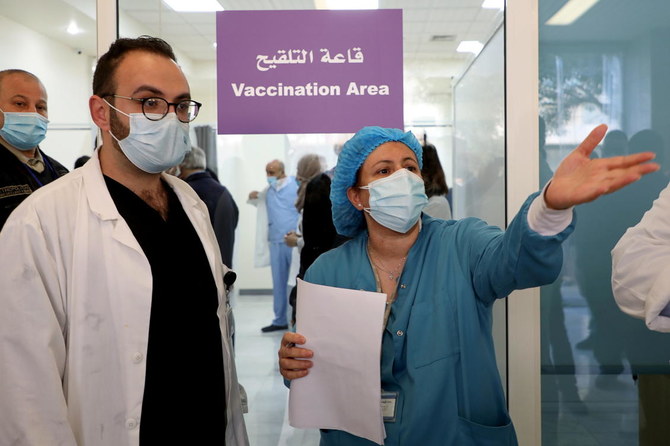
by AFP — BEIRUT: Lebanon kicked off Covid-19 vaccinations Sunday with jabs for health care workers and the elderly in an inoculation drive it hopes will keep the outbreak in check amid a deepening economic crisis. The country has been under lockdown since mid-January, after an unprecedented spike in cases blamed on holiday gatherings forced overwhelmed hospitals to turn away patients. Medical workers and those aged over 75 were the first to receive Pfizer/BioNTech shots at three major Beirut hospitals, a day after a shipment of 28,500 doses arrived at the capital’s airport. The World Bank has allocated $34 million to inoculate an initial two million of Lebanon’s six million inhabitants. “Finally there’s a glimpse of hope that things will get back to normal,” said medical student Dana Chatila, who was waiting in her white lab coat and mask outside the American University Medical Center where she works in the emergency department. “It’s going to take time of course, but the darkness is ending.”
The pandemic has compounded the woes of Lebanese, who are struggling with a dire economic crisis and still reeling from Beirut’s massive port blast last summer that killed more than 200 people and destroyed swathes of the capital. More than half the population lives in poverty, and rights groups have warned millions will struggle to survive without help if coronavirus restrictions last too long. Caretaker prime minister Hassan Diab said: “We hope to reach adequate community protection so life can gradually return to normal in Lebanon as soon as possible.” The first jab was given to Mahmoud Hassoun, head of the intensive care unit at Rafik Hariri Hospital, which has been at the forefront of battling the outbreak. “Hopefully this will be the beginning of the end of this plague in the country,” he told AFP. The second to roll up his shirt sleeves in front of the cameras was popular Lebanese comedian Salah Tizani, 93, known by his stage name Abu Salim. “I’m telling everyone to come and get vaccinated,” he said. “Better to get vaccinated than to be knocked down by this deadly virus.”

by Bloomberg Dubai — Lebanon’s annual inflation rate reached a record high and food prices soared by up to 400% in December, highlighting the dramatic impact on consumers and businesses of the country’s worst financial crisis in decades. Annual inflation was 84.9% in 2020, compared to just 2.9% a year earlier, according to data released by the government’s Central Administration of Statistics on Thursday. It’s the highest since 2013, when the current readings began. Consumer prices jumped 145.8% in December versus the same month of 2019.
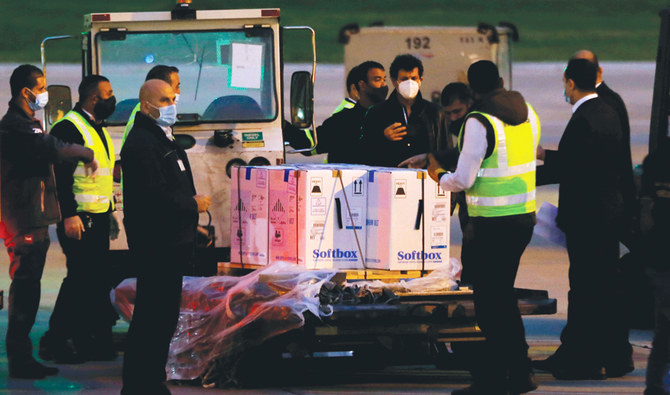
By NAJIA HOUSSARI — arabnews.com — BEIRUT: Lebanon has launched an urgent coronavirus vaccination rollout following the arrival of the first batch of the Pfizer-BioNTech vaccine at Beirut’s Rafic Hariri International Airport. The consignment of 28,500 vaccines arrived from Belgium and was transferred to the Ministry of Health for storage and distribution to approved medical centers and hospitals. Medical and nursing staff as well as paramedics working in coronavirus departments in the country’s hospitals will be among the first to be treated when the rollout begins on Sunday. About 150 people will be vaccinated in three hospitals in Beirut, with the number expected to increase to between 300 and 400 per day by next week in 17 centers across the country. At least 57 vaccination centers are expected to be operating within three weeks. Care homes for the elderly will also be included early in the vaccination program, Reda Al-Mousawi, media adviser at the Ministry of Health, said.
Lebanese hospitals have struggled in the past year amid the country’s acute financial crisis and some of the region’s highest coronavirus infection rates. The total number of virus cases in Lebanon reached 334,086 and 2,462 deaths. Dr. Abdul Rahman Bizri, an infectious disease specialist and head of the National Committee for the Administration of Corona Vaccine, told Arab News that the first people to receive the vaccine will be identified by the three hospitals, which will begin vaccinations on Sunday. “I have not been informed that the president, parliamentary speaker and the prime minister will be first to receive the vaccine,” he added. Bizri said that hospitals have rehearsed their vaccination procedures before opening their doors next week. “We have learned from the mistakes of the Americans and French, and are trying to avoid the same issues,” he said.




